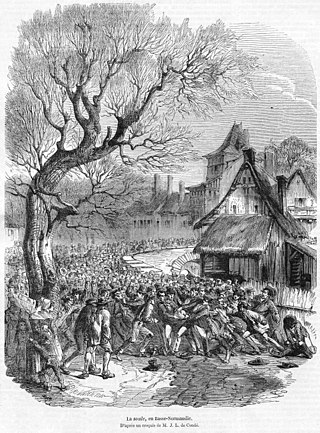
Rugby union, commonly known simply as rugby, is a close-contact team sport that originated at Rugby School in the first half of the 19th century. Rugby is simply based on running with the ball in hand. In its most common form, a game is played between two teams of 15 players each, using an oval-shaped ball on a rectangular field called a pitch. The field has H-shaped goalposts at both ends.

The Rugby Football Union (RFU) is the national governing body for rugby union in England. It was founded in 1871, and was the sport's international governing body prior to the formation of what is now known as World Rugby (WR) in 1886. It promotes and runs the sport, organises international matches for the England national team, and educates and trains players and officials.

The history of rugby union follows from various football games long before the 19th century, but it was not until the middle of that century that the rules were formulated and codified. The code of football later known as rugby union can be traced to three events: the first set of written rules in 1845, the Blackheath Club's decision to leave the Football Association in 1863 and the formation of the Rugby Football Union in 1871. The code was originally known simply as "rugby football". It was not until a schism in 1895, over the payment of players, which resulted in the formation of the separate code of rugby league, that the name "rugby union" was used to differentiate the original rugby code. For most of its history, rugby was a strictly amateur football code, and the sport's administrators frequently imposed bans and restrictions on players who they viewed as professional. It was not until 1995 that rugby union was declared an "open" game, and thus professionalism was sanctioned by the code's governing body, World Rugby—then known as the International Rugby Football Board (IRFB).
Home Nations is a collective term with one of two meanings depending on context. Politically it means the nations of the constituent countries of the United Kingdom. In sport, if a sport is governed by a council representing a territory, such as an island, the term can refer to the nations of the constituent countries on that territory or island. In Great Britain the Home Nations become England, Scotland and Wales, and Ireland have his Home Nation govern body, the Irish Rugby Football Union (IRFU).
Andrew David Farrell is an English professional rugby union coach and former dual-code rugby player who has been coaching the Ireland national team since 2020.

Lee Mears is an English former professional rugby union player who played as a hooker. He played his club rugby for Bath from 1998 until his retirement in 2013. He also played for the England national team from 2004 to 2012; he earned 42 caps and played in two Rugby World Cups, and played for the British & Irish Lions on their 2009 tour to South Africa.

Rugby league is played across England but is most popular in Northern England, especially Yorkshire and Lancashire where the game originated. These areas are the heartland of rugby league. The sport is also popular in Cumbria where the amateur game is particularly powerful.

Rugby union in England is one of the leading professional and recreational team sports. In 1871 the Rugby Football Union, the governing body for rugby union in England, was formed by 21 rugby clubs, and the first international match, which involved England, was played in Scotland. The England national team compete annually in the Six Nations Championship, and are former world champions after winning the 2003 Rugby World Cup. The top domestic men's club competition is Premiership Rugby, and English clubs also compete in international competitions such as the European Rugby Champions Cup. The top domestic women's competition is the Premier 15s.
The 1991 Women's Rugby World Cup was the first Women's Rugby World Cup. The tournament was not approved by the International Rugby Board (IRB), yet it still went ahead despite the disapproval of the sports governing body. France confirmed their participation only minutes before the draw was made on 26 February. Representatives of the IRB, WRFU and RFU attended the final, but it was not until 2009 that the IRB officially endorsed the event as a "world cup" when it published, for the first time, a list of previous winners in a press release.

The Army Rugby Union (ARU) is the governing body for rugby union in the British Army and a constituent body of the Rugby Football Union (RFU). The ARU was formed on 31 December 1906 and marked the fulfilment of Lieutenant J. E. C. "Birdie" Partridge's idea to have a body to administer the playing of rugby union in the British Army.

Old Albanian Rugby Football Club (OAs) is a rugby union club based in St Albans, Hertfordshire, England. The club currently play in National League 2 East.

Women's rugby union is a full contact team sport based on running with the ball in hand. The same laws are used in men's rugby union with the same sized pitch and same equipment. Rugby was originally a men's sport, and women's rugby has become popular only more recently. These days, women's rugby is gaining a higher profile thanks to international tournaments' exposure and financial investment.
The Wales women's national rugby union team first played in 1987. Wales plays in the Women's Rugby World Cup and the Women's Six Nations Championship.
The Women's Premiership, also called the RFUW Premiership was the top level of women's rugby union in England until 2017. It was formed in 1990 and was run by the Rugby Football Union for Women. It was superseded in the 2017/18 season by Premier 15s.
Donald Rutherford was an England international rugby union player and administrator. He was the first ever Technical Director of the Rugby Football Union at Twickenham, becoming Director of Rugby where he served with distinction from 1969 – 1999.

Rugby league is played across England, Ireland, Scotland and Wales, but its heartland in parts of the North of England is where the sport is most popular, and is where the majority of professional clubs are based. The sport was first established in the George Hotel, Huddersfield, where 22 clubs split from the Rugby Football Union to form the Northern Rugby Football Union.
Dorset and Wilts Rugby Football Union is the governing body for rugby union in the counties of Dorset and Wiltshire, England. Dorset & Wilts RFU is a Constituent Body of the Rugby Football Union (RFU) and is responsible for the management and administration of the game within the counties of Dorset and Wiltshire of all forms and at all levels. Originally Dorset and Wiltshire had their own county teams but would start to merge into one body towards the end of the 1930s, having already played a combined match against Hampshire in 1935-36 which Dorset & Wilts won 9–6. By 1939 Dorset & Wilts agreed to become a unified rugby football union to take part in the 1940-41 County Championships but this was postponed by the outbreak of World War II. After the war Dorset & Wilts played its first official county match in 1947 and attained full county status from the RFU in 1949.

Harrogate Rugby Union Football Club is an English rugby union team based in Harrogate, North Yorkshire. The club runs four senior sides. The first team play in National League 2 North, having been promoted from the North Premier in 2019–20. The second team, Harrogate Georgians, play in the Yorkshire RFU Merit Premiership and the third team play in the Yorkshire RFU 2 Central/North Merit League. The club also fields a ladies' team completing the four senior teams in the RFUW Championship, and eight junior teams.
Bristol Bears Women, formerly Clifton Ladies RFC, then Bristol Ladies, is a women's rugby union team based in Bristol, England. They are a standalone, independent rugby club, running in partnership with the Bristol Bears since becoming affiliated to them in 2008 and play their home matches at Dings RFC in the Premier 15s.
Deborah Griffin is a pioneer of the growth of women's rugby, both in England and globally.










